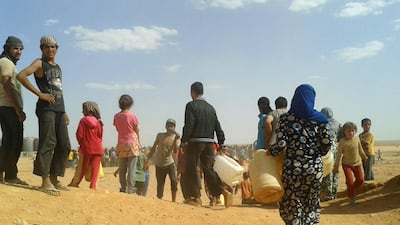About 50,000 Syrian refugees camped in a desert area on the border with Jordan received their first aid supplies in six months on Monday after Amman agreed to "a one time only" arrangement.
The aid delivery was approved by the Jordanian government on Sunday as an exceptional measure, after the United Nations submitted a plan for future aid deliveries to the Rukban camp to be made from inside Syrian territory.
Aid agencies have been struggling for months to convince the government to grant them access to the camp, located between two berms in the no-man’s-land on the Syrian-Jordanian border.
Jordan, which hosts an estimated 1.3 million refugees from Syria's civil war — of whom only 655,000 are registered with the UN refugee agency, considers the Rukban camp the responsibility of Syria and the international community.
“It is an exceptional measure and purely for humanitarian reasons,” said Mohammad Al Kayed, spokesman for the ministry of foreign and expatriate affairs. “It is not Jordan’s responsibility to provide aid to the refugees, it is the UN’s.”
Jordan's Petra news agency said the approval was granted following an agreement between a foreign ministry committee, aid agencies and the UN.
“It took months of negotiations and pressure from UN agencies, embassies and donors to convince Jordan to allow access of aid to the camp,” said a UN agency official.
The aid, which was dropped over the border by cranes and carried to the camp in lorries, is meant to tide over the refugees until the procedures for the delivery of assistance from with Syria are finalised.
The dire living conditions at the Rukban camp, which began to take shape in 2014 as Jordan restricted the entry of refugees through a border crossing in the area, have been made worse by the onset of winter and limited access to health care.
“There is malnutrition and families have run out of money and resources, while others rely on smugglers to get basic goods that are overpriced,” the UN official said. “It is not a proper settlement and they are using the flimsiest shelters. It is biting cold and the environment is not safe.”
Another aid official said conditions at the camp were especially hard for children, women and the elderly.
“The main challenge right now is the weather and the limited access to food and other supplies,” he said. “They have been there for almost two years and they are short of any kind of assistance.”
UN agencies refused to reveal details of the aid delivery that began on Monday, saying they did not want it to be affected by media exposure.
However, Rakan Khdeir, the commander of a Syrian tribal force charged with protecting the camp, said the aid delivery would continue for a week.
“Initially, 10,000 baskets, which contain 10 kilos of sugar and 10 kilos of rice and tea, will be delivered, as well as clothes, throughout the entire week,” he said. “The delivery went smoothly today.”
The civilian administration at the camp posted videos of trucks delivering aid to the refugees.
Aid flow to the camp was interrupted after an ISIL-claimed suicide attack on the border outpost nearby in June 2016 killed seven members of Jordan's security forces.
The last delivery of relief to the camp, including food, hygiene kits and solar lamps, was between May and June last year but reached only 35,000 people, mostly women and children, according to the UN refugee agency.
"I blame the international community for turning its back," said Mr Khdeir, the tribal army commander. "Jordan cannot shoulder the entire burden. We are facing a humanitarian issue."

